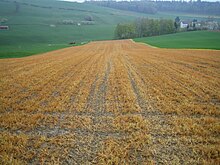Agent used to destroy or inhibit plant growth. especially on weeds
Herbicides (US: /ˈɜːrbɪsaɪdz/, UK: /ˈhɜːr-/), also commonly known as weed killers, are substances used to control undesired plants, also known as weeds. Selective herbicides control specific weed species while leaving the desired crop relatively unharmed, while non-selective herbicides (sometimes called "total weed killers") kill plants indiscriminately. The combined effects of herbicides, nitrogen fertilizer, and improved cultivars has increased yields (per acre) of major crops by 3x to 6x from 1900 to 2000.


In the United States in 2012, about 91% of all herbicide usage, determined by weight applied, was in agriculture. In 2012, world pesticide expenditures totaled nearly $24.7 billion; herbicides were about 44% of those sales and constituted the biggest portion, followed by insecticides, fungicides, and fumigants. Herbicide is also used in forestry, where certain formulations have been found to suppress hardwood varieties in favor of conifers after clearcutting, as well as pasture systems.
